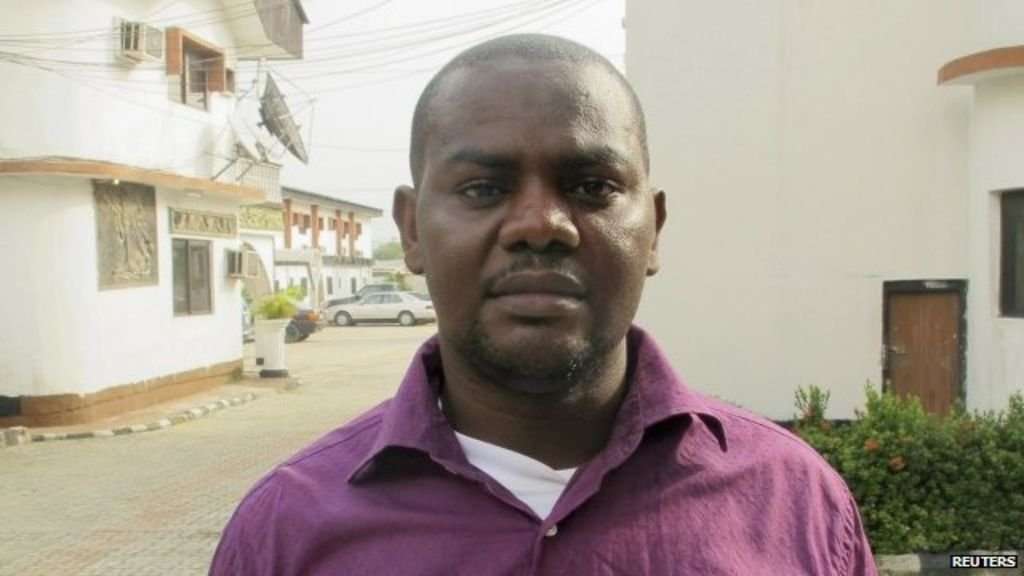Media playback is unsupported on your device Media caption Jed Chamberlain, from DCN Global diving company, describes how Harrison Okene (pictured) was rescued
A Nigerian man has survived for two-and-a-half days trapped 30m (98ft) deep in freezing seawater.
Harrison Okene, 29, was on board the tug boat Jascon-4 when it capsized in heavy swells.
It sank to the seabed, upside down, but Mr Harrison was trapped in an air pocket and able to breathe.
Of the other 12 people on board, 10 bodies have already been found and Mr Harrison is assumed to be the only survivor.
Mr Harrison told Reuters journalist Joe Brock that he could hear fish eating the dead bodies of his fellow crew members.
The Jascon-4 capsized on 26 May, about 32km (20 miles) off the coast of Nigeria, while it was stabilising an oil tanker at a Chevron platform.
Mr Harrison was working there as a cook, according to the ship's owners, West African Ventures.
Mr Harrison told Reuters he was in the toilet when he realised that the boat was beginning to turn over, and as the vessel sank, he managed to find his way to an area with an air pocket.
Image caption Mr Harrison survived in an air pocket, 30m underwater in pitch darkness
"I was there in the water in total darkness just thinking it's the end. I kept thinking the water was going to fill up the room but it did not," he said.
"I was so hungry but mostly so, so thirsty. The salt water took the skin off my tongue."
"I could perceive the dead bodies of my crew were nearby. I could smell them. The fish came in and began eating the bodies. I could hear the sound."
But after 60 hours, Mr Harrison heard the sound of knocking.
A team from the DCN global diving company had come to investigate - sent by Chevron and West African Ventures.
"We expected it to be a body recovery job," DCN spokesperson Jed Chamberlain told the BBC's Impact programme.
Mr Harrison "actually grabbed the second diver who went past him," Mr Chamberlain said, adding that the diver concerned got quite a fright.
"This changed the whole nature of the operation to a rescue operation."
But even after Mr Harrison had been found, he still faced a complex process to bring him out safely.
Having been at such depth for so many hours, he needed time in a decompression chamber to normalise his body pressure.
Christine Cridge, a medical director at the Diving Diseases Research Centre (DDRC), advised the rescue team during this process.
"It's a situation I've not come across before," she told the BBC's Newsday programme.
"After a certain amount of time at pressure, nitrogen will dissolve into the tissues. If he'd ascended directly from 30m to the sea surface..... it's likely he'd have had a cardiac arrest, or at best, serious neurological issues.
Mr Harrison describes his story as a "miracle", but he also told Reuters: "When I am at home sometimes it feels like the bed I am sleeping in is sinking. I think I'm still in the sea again. I jump up and I scream."
Jan Messchendorp, general manager of West African Ventures said in a statement: "We are very grateful for the survival of Mr Harrison. Our thoughts continue to be with the families of the rest of the crew."
He added that the search and rescue operation has now been stopped for safety reasons.

Wretschko on March 28th, 2019 at 02:47 UTC »
What...the...fuck?!
"Harrison Okene, the ship’s cook, was in the bathroom when the boat turned over and began to sink. Most of the other crew members were locked in their cabins — a safety precaution necessitated by the pirates who regularly rob and abduct vessels in that area. That safety measure, however, sealed the other crew members’ doom."
bipedal_mammal on March 28th, 2019 at 01:37 UTC »
Video of the moment they found him
Llamaverses on March 28th, 2019 at 01:17 UTC »
I can't imagine.. just a hellish nightmare. He prob sat there trying to figure out how he would die. The sounds around him alien and terrifying.